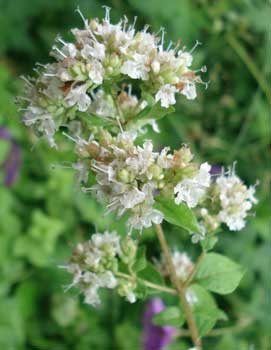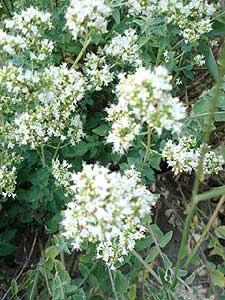
Greek Oregano
"These smiling fields, now covered with verdure; of these cool & pleasant gardens, abounding in shady & delightful walks, in gently flowing streams & rivulets, in sequestered nooks, in birds that enliven them with song, & in flowers & odorous herbs -- this admiration & enthusiasm, I repeat, seemed to me in perfect harmony with the religious feeling that filled my soul."
-Juan Valera
(1824-1905)
One of the most popular culinary herbs is Origanum vulgare var hirtum (syn. O. heracleoticum), or Greek Oregano. The taste is somewhat milder used fresh-picked, still very strong, & quite a different & equally pleasing flavor compared to dried.(1824-1905)
 Whether used fresh or dried, it should be added to soups late in the cooking, as the flavorfulnesss does break down if the little leaves are boiled as long as you'd need to boil potatoes & other soup ingredients.
Whether used fresh or dried, it should be added to soups late in the cooking, as the flavorfulnesss does break down if the little leaves are boiled as long as you'd need to boil potatoes & other soup ingredients.Mixed with other fresh-picked & chopped herbs like basil & savory, it can be sprinkled thinly on top of casseroles just a few minutes before finished baking, to dry out as a tasty crunchy top; or on pizza shortly before done baking or even just plain raw over the hot cheese.
As a garden ornamental it's moderately attractive, forming clumps of three-foot tall upright (or tippy) stems of furry leaves, topped with tussy-mussies of tiny white flowers.
The blooms are best looking when they first appear early in summer, & can be used for redolent bouquets, or even dried for dry flower arrangement though they'll be easily damaged because brittle. As the blooms age the tiny individual florets go to seed at different rates so it becomes a less evenly attractive as a bloom.
So if it weren't so darned tasty it probably would not be grown strictly for ornamental purposes, as it's never spectacular, though I like it. And it does have value beyond the culinary, as it will thrive in some very harsh places. Most xeric garden perennials frankly will dry up & die if you really fail to water them, but Greek oregano takes drought tolerance to extreme.
There's a harsh dry corner at the head of the alley & edge of our property that is difficult to get water to, so I planted a number of herbs which I was pretty sure would never need watering. These include Greek horehound (Ballota pseudodictamnus), Russian sage (Perovskia atriplicifolia), & the very Greek oregano shown here.
Even during a record-breaking rainless summer I never got out to that corner with a hose, & the only choice of plant that showed any sign of stress was the horehound, which merely browned a bit. All these choices have hairy leaves, which is the trait of sun-loving drought-hardy perennials generally.